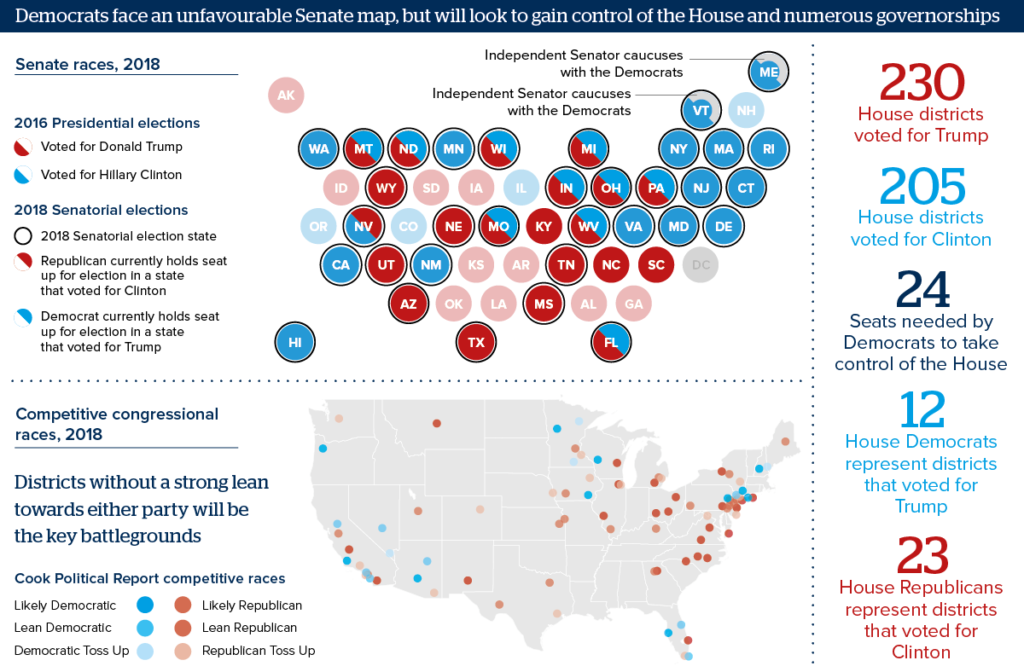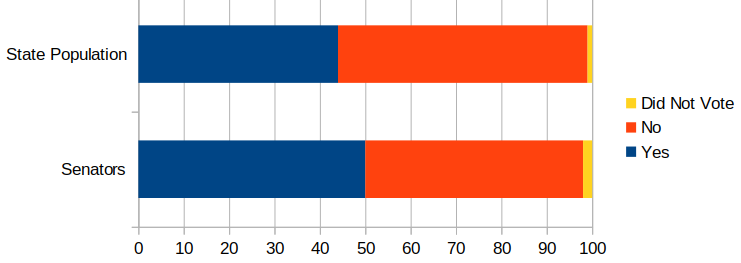Editor’s note: Bogdan Globa is a Ukrainian LGBTQ activist who lives in New York City since late 2016. He received the Kyiv Post’s Top 30 Under 30 award in 2016.
With less than one month left until the midterm election in the U.S. House of Representatives and Senate, the political battles in Washington become fiercer every day.
For Democrats and the liberal movement, these elections may be the last hope to save Western liberal values. If Democrats lose, many rights and freedoms gained over the last few decades could be reversed. Among other things, the Trump Administration won the battle to appoint Judge Brett Kavanaugh to the Supreme Court and thus have gained a conservative majority in the highest court. This opens the door for Conservatives to potentially abolish same-sex marriages and prohibit abortions. Judge Kavanaugh himself has publicly supported such initiatives.
Multiple American civil rights movements including LGBTQ, women, migrants, African-Americans are now in despair as a large number of the Trump Administration initiatives directly affect these communities. The White House mercilessly curtailed Obama’s liberal initiatives in order to please conservative voters. For example, they signed a transgender military ban, abolished prohibition of workplace discrimination based on sexual orientation, and rescinded DACA.
All or nothing
To say the least, future elections will be life-changing for both the American and global liberal movements. If Republicans win and pursue a conservative agenda, the LGBTQ movement faces the threat of having decades of progress rolled back. If this happens, the consequences for global LGBTQ movement will be disastrous as many developing countries, including Ukraine, look to the U.S. as they strive to make progress in these areas.

Infographics by the U.K. consulting firm Oxford Analytica show the electoral map of U.S. ahead of Nov. 6 midterm elections. (dailybrief.oxan.com)
The political passiveness of the last two generations is one of the reasons for the current situation. The children of baby boomers and generation Z were born and raised during a period of relative calm and there has been rapid economic development. In other words, these two generations live with firm conviction that democracy and liberal values do not require protection, they have always been there and they always will be there.
As a matter of fact, some young people and members of the LGBTQ community did not support Hillary Clinton in the presidential election. They claimed apolitical or radical socialist or “anti-establishment” views. These typically contradict generally accepted social, political and economic principles. According to recent polls by the Public Religion Research Institute, only 28 percent of young people aged 18-29 are planning to take part in the elections, while 48 percent said they did not plan to take part in the midterm elections in November 2018.
Ukrainian déjà vu
I arrived in the U.S. at a historical moment of political regime change. I learned about Trump winning the presidency on my flight from Kyiv to New York. I have lived in the U.S. for two years and for some reason, I have a feeling of a Ukrainian déjà vu.
Perhaps, for the first time ever, Ukraine has gone through these types of challenges earlier than the U.S. The events that have occurred over the last 2.5 years resemble Ukraine from 2010-2014, when President Viktor Yanukovych was in power. In fact, it gives us a reason to think that Ukraine was the testing ground for the political experiments and strategies of the team of Paul Manafort, Trump’s former campaign manager and Yanukovych’s former advisor and strategist – strategies that Manafort used to bring Yanukovych to power in Ukraine and subsequently applied to the U.S. elections in 2016.
For example, viral videos stating that both candidates are “two of a kind” and that “young people are beyond politics” encouraged the youth to not participate in the 2016 elections. In Ukraine, this technology was titled “against all.” Thus, Republicans were able to reduce the number of liberal voters (young people tend to be more liberal and share democratic views). This may have cost Clinton a victory.
The issues of migrants, the LGBTQ community and global transformations have been artificially raised and exacerbated in the election process. Republicans scared some American voters with the issues of gay marriage, same-sex couples adoptions (which are currently legal in the U.S.), immigrants, global conspiracies against the United States and jobs going to China. And while for most Americans, this radically conservative rhetoric was unusual, Ukrainians have already heard it all.
We remember how pro-Russian politicians in Ukraine (Party of Regions, Natalia Vitrenko, Petro Symonenko, and others) spoke of same-sex marriages, conspiracy theories, and migrants to scare Ukrainians into supporting them.
Today we are witnessing how political technology mobilizes conservative voters using sensitive topics and turning minorities into public enemies. Thus, the confrontation between right and left intensifies and people are forced to vote under pressure of an “either-or” prearranged situation.
Experts and sociologists say that this is the largest ideological confrontation between conservative and liberal Americans throughout the history of the United States. This ideological antagonism is similar to the political standoff in Ukraine between the “pro-Russian east” and “pro-European west” which was artificially orchestrated by political technologists. One political advertisement actually mentioned there are “different sorts of Ukrainians,” meaning that some are by definition better than others.
Cunning election traps
Now the fun part: The conservatives victory was made possible by some of the mechanisms created by the founding fathers of the United States and set forth in the Constitution. Today, the tools that were supposed to balance the political situation, unite the states, and make the elite seek political compromise have actually caused unhealthy distortion and a reverse effect. The Senate is composed of two senators from each state and the votes of two senators from California representing 40 million residents have equal consideration as votes of the senators from Utah representing 2 million residents. The historical process of urbanization has made it easier for conservative religious minorities living in rural areas to exercise more power and influence.
The recent vote for judge Kavanaugh which allowed Republicans to form a pro-conservative majority in the Supreme Court was a test case. The 50 senators who voted “yes” represented 143 million Americans, at the same time, the senators who voted “no” covered 181 million American voters.

Senate vote to confirm Justice Kavanaugh and the percent of the U.S. population in the states represented by those senators. (govtrackinsider.com) (GovTrack.us)
A similar situation affected Clinton during the 2016 election; she outpaced Trump by approximately 3 million popular votes but lost due to intricacies of the U.S. electoral system.
It is also worth mentioning gerrymandering – a practice intended to establish a political advantage for a political party or a group by manipulating voting district boundaries. Thus, the Republicans have been able to change the boundaries of the districts in order to erode the votes of minorities and various groups (LGBT, African-Americans, Mexican-Americans, and other immigrants) who, in their majority, support Democrats.
Thus, American society, which is democratic and liberal in its core, has become hostage to the conservative minority, which has taken control of all the branches of power (including legislative, presidential and judicial) due to the peculiarities of the U.S.’s constitutional mechanisms.
There is only one way out of this dark conservative labyrinth. The Democratic and liberal supporters, especially young people should, no matter what, vote in the midterm elections to prevent Republicans with their conservative agenda from celebrating another victory. Otherwise, democratic values that the U.S. stands for may become the thing of the past, and we will face a dark future.
Bogdan Globa is a Ukrainian LGBTQ activist who lives in New York City since late 2016. He received the Kyiv Post’s Top 30 Under 30 award in 2016.
